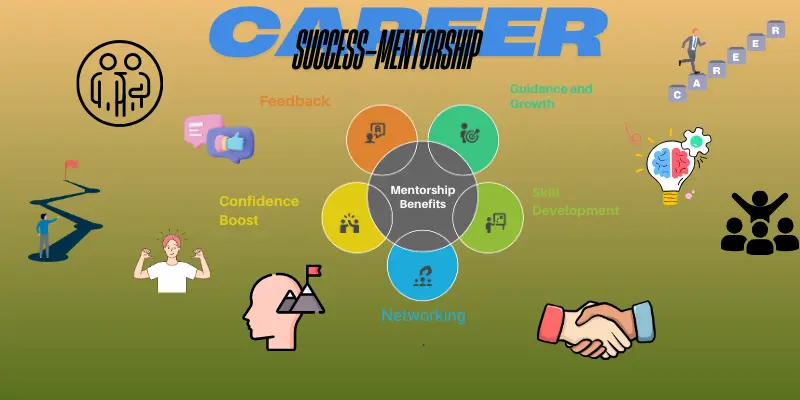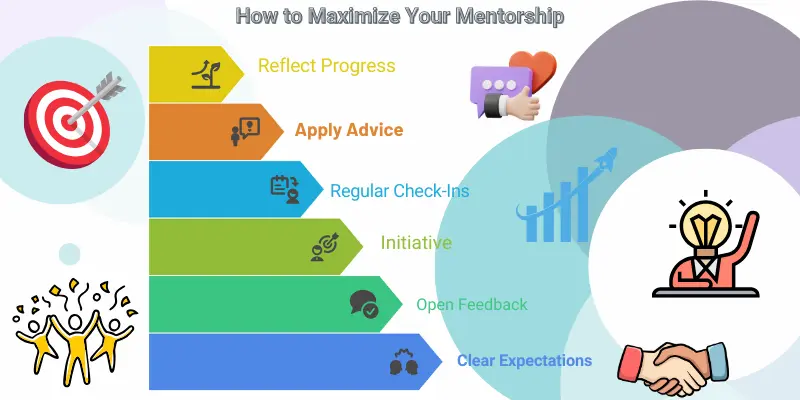Unlocking the Power of Mentorship: Why You Need a Mentor (And How to Find One)
Published: 26/03/2025
Ever feel like you’re putting in the work but still not getting ahead? You’ve got the skills and drive, but something’s missing. If you’ve ever found yourself questioning why some people seem to be moving forward with ease, while you’re stuck at a crossroads, you’re not alone. Many professionals feel the same way.
What if the missing piece isn’t more effort, but having someone guide you through the tough spots? Mentorship is often the overlooked game-changer—it’s when a more experienced person shares their wisdom, helps you avoid mistakes, and gives you the confidence to move forward. Think of it as having a personal guide who’s already walked the path you’re on.
Research shows that 70% of people with a mentor report higher job satisfaction, and 55% feel more confident in their career choices (Source: Forbes, 2020). Mentorship clearly makes a difference, but the big question is: how do you find the right mentor?
In this post, we’ll break down why mentorship is essential for both personal and professional growth. I’ll also share actionable tips on how to find a mentor who can help you unlock your potential and guide you to new opportunities.
Curious to see how a mentor could transform your career? Keep reading, and let’s dive in!
| Key Insights |
|---|
|
Guidance and Professional Growth: Mentors offer tailored advice drawn from their experiences, helping you achieve both personal and career objectives. Networking and Connections: Access to broad networks provides opportunities that might otherwise stay hidden. Confidence and Skill Development: Mentorship boosts self-confidence, refines key professional skills, and nurtures personal growth. |
Why a Mentor Can Be Your Secret Weapon for Success
Mentorship is like having a secret weapon in your career journey. It’s not just about having someone to look up to; it’s about gaining valuable insights and support that can help you grow both personally and professionally. Here’s why having a mentor can be a game-changer:

Guidance and Personal Growth:
- A mentor helps you see the bigger picture. They can assist you in identifying your strengths and setting realistic goals.
- Think of them as a GPS for your career, guiding you toward your desired destination with clear directions.
Skill Development and Lifelong Learning:
Mentors bring a wealth of experience to the table. They can offer advice on how to enhance your current skills and develop new ones.
- It’s like having a personal trainer who knows exactly which exercises will help you improve the most.
Networking and Professional Connections:
- One of the biggest advantages of having a mentor is access to their network. They can introduce you to key people in your industry.
- Imagine having a backstage pass to the best networking events, opening doors to new opportunities and collaborations.
Boosting Confidence and Emotional Well-being:
- Let’s face it, navigating a career can be tough. A mentor provides emotional support and encouragement, boosting your confidence.
- It’s like having a cheerleader who’s always in your corner, ready to celebrate your successes and help you through challenges.
Objective Feedback:
Mentors offer a fresh perspective and honest feedback. They can help you see things you might have missed and provide constructive criticism.
- It’s like having a trusted advisor who helps you refine your approach and make better decisions.
Accelerated Growth:
With a mentor, you can fast-track your learning and development. Their guidance can help you avoid common pitfalls and make the most of your opportunities.
- It’s like having a shortcut to success, helping you achieve your goals more quickly and efficiently.
A mentor is more than just a guide; they are a partner in your career journey. They provide the tools, support, and insights you need to navigate the complexities of your profession and reach your full potential.
Comprehensive Benefits Table
| Aspect | Benefit | Action Step |
| Guidance | Clarification of goals Constructive advice Professional insights | Define clear objectives Ask for specific feedback |
| Networking | Expanded professional contacts Introductions to industry leaders Access to events and conferences | Attend networking events Use professional platforms |
| Emotional Support | Improved self-confidence Safe, guiding space Reliable, ongoing feedback | Establish regular touchpoints Express openly your challenges |
| Skill Enhancement | Practical advice Real-world task guidance Continuous improvement | Identify areas of growth Work on challenging projects |
Your Mentor Match: How to Find the Best Fit
Finding the right mentor can feel like searching for a needle in a haystack, but with the right approach, you can find someone who truly aligns with your goals and values. Here’s a step-by-step guide to help you in your quest for the perfect mentor:
Identify Your Needs:
- Start by asking yourself what you hope to gain from a mentorship. What are your career goals? What specific skills do you want to develop?
- Consider the challenges you’re facing and the areas where you need the most guidance. Knowing what you need will help you find a mentor who can provide the right support.
Look Within Your Network:
- Sometimes, the best mentor is someone you already know. Think about colleagues, former bosses, or professionals you admire in your industry.
- These individuals already understand your work environment and can offer insights tailored to your situation.
Leverage Professional Associations:
- Join industry groups, attend workshops, and participate in conferences. These events are great for meeting potential mentors who are passionate about your field.
- Professional associations often have formal mentorship programs, making it easier to connect with experienced professionals.
Be Proactive:
- Don’t wait for a mentor to come to you. If there’s someone you admire, reach out and express your interest in learning from them.
- Most people are flattered by the request and willing to help. Be clear about what you hope to learn and why you think they would be a good mentor.
Consider Compatibility:
- A good mentor-mentee relationship is built on trust and mutual respect. Look for someone whose values and work style align with yours.
- It’s important to feel comfortable sharing your goals and challenges with your mentor.
Set Clear Expectations:
Once you’ve found a potential mentor, discuss what you both hope to gain from the relationship. Set clear expectations and goals.
- This will help ensure that both parties are on the same page and committed to making the mentorship work.
Be Open to Different Formats:
Mentorship doesn’t always have to be a formal, long-term commitment. It can be a one-time conversation, a short-term arrangement, or even a group mentorship.
- Be open to different formats and see what works best for both you and your mentor.
Show Appreciation:
Remember to thank your mentor for their time and advice. Show appreciation for their support and let them know how their guidance has helped you.
- A little gratitude goes a long way in maintaining a positive and productive mentorship relationship.
Finding the right mentor is about being proactive, clear about your needs, and open to different possibilities. With the right approach, you can find a mentor who will provide the guidance and support you need to achieve your career goals.
How to Maximize Your Mentorship and Achieve Your Goals
A mentorship is a valuable relationship that can significantly impact your personal and professional growth. To ensure you get the most out of this partnership, here are some key strategies to consider:

Set Clear Expectations:
From the outset, be clear about what you hope to achieve from the mentorship. Discuss your goals, the skills you want to develop, and the areas where you need guidance.
- Similarly, understand what your mentor expects from you. This mutual understanding sets the foundation for a successful relationship.
Be Open to Feedback:
Constructive criticism is a crucial part of growth. Listen to your mentor’s feedback with an open mind and a willingness to learn.
- Remember, their insights are meant to help you improve, so embrace their advice and use it to refine your approach.
Take Initiative:
A mentorship is a two-way street. While your mentor provides guidance, it’s up to you to drive the relationship forward.
- Proactively seek their advice, ask questions, and share your progress. Show that you are committed to your growth and value their input.
Schedule Regular Check-Ins:
Consistency is key to a successful mentorship. Set up regular meetings to discuss your progress, challenges, and any new goals you’ve set.
- These check-ins provide structure and ensure that you stay on track. They also give you a platform to address any concerns or obstacles you’re facing.
Apply Their Advice:
The true value of mentorship lies in applying the advice you receive. Take the insights your mentor offers and put them into practice.
- Whether it’s trying a new skill, approaching a problem differently, or networking more effectively, active application is key to growth.
Share Your Successes and Challenges:
Keep your mentor updated on your achievements and the challenges you’re facing. This transparency helps them provide more tailored advice.
- Celebrating successes with your mentor can also be incredibly motivating, while discussing challenges can lead to valuable problem-solving sessions.
Be Grateful and Show Appreciation:
Acknowledge the time and effort your mentor invests in you. Express your gratitude and let them know how their guidance has impacted you.
- A simple thank-you can go a long way in strengthening your relationship and showing that you value their support.
Reflect on Your Progress:
Regularly take time to reflect on how far you’ve come. Consider the goals you’ve achieved, the skills you’ve developed, and the insights you’ve gained.
- This reflection not only boosts your confidence but also helps you identify areas for further growth.
Making the most of your mentorship is about being proactive, open to feedback, and committed to applying the advice you receive. By nurturing this relationship, you can unlock new opportunities and achieve your career aspirations.
Common Mistakes to Avoid
Embarking on a mentorship journey is a significant step towards personal and professional growth. However, to make the most of this relationship, it’s important to steer clear of some common pitfalls. Here are the key mistakes to avoid:
Choosing the Wrong Mentor:
Mistake: Selecting a mentor solely based on their title or reputation, without considering if they align with your goals and values.
- Why It’s a Problem: A mentor who doesn’t understand or share your aspirations may not provide the guidance you need.
- Example: “A mentor should be someone who aligns with your goals and values, not just someone with a fancy title.”
- How to Avoid It: Take the time to assess potential mentors. Look for someone who has experience in your field of interest and whose values resonate with yours. A good mentor-mentee fit is crucial for a successful relationship.
Lack of Initiative:
Mistake: Waiting for your mentor to drive the relationship and not taking an active role in your own development.
- Why It’s a Problem: Mentorship is a two-way street. If you’re not proactive, you may miss out on valuable opportunities for growth.
- Example: “Your mentor is there to guide you, but it’s up to you to drive the relationship and make the most of it.”
- How to Avoid It: Take initiative by setting up regular meetings, coming prepared with questions, and actively seeking feedback. Show your mentor that you are committed to your growth and value their guidance.
Not Following Through on Advice:
Mistake: Failing to act on the advice and feedback provided by your mentor.
- Why It’s a Problem: Not following through on your mentor’s advice can hinder your progress and make the mentorship less effective.
Example: “If you don’t act on your mentor’s advice, you’re missing out on valuable opportunities for growth.”
- How to Avoid It: Treat your mentor’s advice as a roadmap for your development. Make a conscious effort to implement their suggestions and reflect on the outcomes. Share your progress with your mentor and discuss any challenges you encounter.
Overdependence:
Mistake: Relying too heavily on your mentor for decisions and solutions, rather than developing your own problem-solving skills.
- Why It’s a Problem: While mentors provide guidance, it’s important to cultivate your independence and critical thinking.
- How to Avoid It: Use your mentor as a sounding board, but also take the time to analyze situations and come up with your own solutions. Balance seeking advice with self-reflection and decision-making.
Infrequent Communication:
Mistake: Not maintaining regular contact with your mentor, leading to a lack of momentum in the relationship.
- Why It’s a Problem: Regular communication is essential for a productive mentorship. Without it, the relationship may lose its impact.
- How to Avoid It: Schedule consistent check-ins and stick to them. Use these meetings to discuss your progress, challenges, and goals. Consistent communication keeps the relationship dynamic and beneficial.
Not Showing Appreciation:
Mistake: Failing to acknowledge and appreciate the time and effort your mentor invests in you.
- Why It’s a Problem: A lack of appreciation can lead to a strained relationship and diminish your mentor’s willingness to help.
- How to Avoid It: Regularly express your gratitude and let your mentor know how their guidance has helped you. A simple thank-you can go a long way in strengthening your bond.
Avoiding these common mistakes can help you build a strong, effective mentorship relationship. By being proactive, appreciative, and committed to your growth, you can make the most of this valuable opportunity.
Ready to Grow? Start Your Mentorship Journey Today
Congratulations on taking the first step towards harnessing the power of mentorship! As you consider embarking on this transformative journey, here are the key takeaways to keep in mind:
Mentorship is a Catalyst for Growth:
- It provides guidance, support, and opportunities that can significantly accelerate your personal and professional development.
The Right Mentor Makes All the Difference:
- Choose someone who aligns with your goals and values, not just someone with a fancy title or impressive resume.
Active Participation is Key:
- A mentorship is a two-way street. Be proactive, ask questions, and take initiative to drive the relationship forward.
Apply Feedback and Advice:
- The true value of mentorship lies in acting on the insights and guidance you receive. Don’t just listen—implement and reflect.
Remember, mentorship is not just about finding someone to guide you; it’s about building a relationship that fosters growth and learning. Be open to feedback, show appreciation for your mentor’s time, and always strive to apply what you’ve learned. The journey may have its challenges, but the rewards are well worth the effort.
Ready to unlock your potential through mentorship? Here’s your next step:
- Join the conversation! Share your thoughts, experiences, or questions in the comments below. We’d love to hear from you and support you on your mentorship journey.
- Subscribe to our newsletter for more insights and advice on personal and professional development.
Mentorship is your secret weapon for success. It’s the bridge between where you are and where you want to be. So, take the leap, find a mentor who inspires you, and watch as new doors open to a world of possibilities. Your future is in your hands—make it count!
“A mentor is someone who sees more talent and ability within you than you see in yourself and helps bring it out of you.”Bob Proctor, Author, Speaker, and Personal Development Expert
Mentorship Made Simple: Your Top Questions Answered
While both mentors and coaches provide guidance, a mentor typically offers advice based on their own experiences in a specific field, whereas a coach focuses on helping you develop specific skills or achieve particular goals through structured processes.
Start by joining professional associations, attending industry events, or participating in online forums related to your field. These are great places to meet potential mentors. You can also use platforms like LinkedIn to connect with professionals you admire.
Differences in opinion can be valuable learning opportunities. Approach the conversation with an open mind, listen to their perspective, and use it as a chance to gain new insights. Remember, mentorship is about growth and learning, not just agreement.
Communicate openly with your mentor about your concerns. Discuss what you’re hoping to gain and see if there are ways to adjust the mentorship to better meet your needs. If necessary, consider seeking additional mentors or exploring other resources.
Prepare a list of questions or topics before each meeting. Focus on your goals, challenges, and areas where you need guidance. You can also discuss industry trends, career development strategies, or personal growth topics.
For those looking to deepen their mentorship experience, consider setting specific, measurable goals, seeking feedback on your progress, and exploring opportunities for collaboration or joint projects. Additionally, think about how you can give back to your mentor, such as by sharing resources or offering your own expertise.

- Be Respectful
- Stay Relevant
- Stay Positive
- True Feedback
- Encourage Discussion
- Avoid Spamming
- No Fake News
- Don't Copy-Paste
- No Personal Attacks

- Be Respectful
- Stay Relevant
- Stay Positive
- True Feedback
- Encourage Discussion
- Avoid Spamming
- No Fake News
- Don't Copy-Paste
- No Personal Attacks





